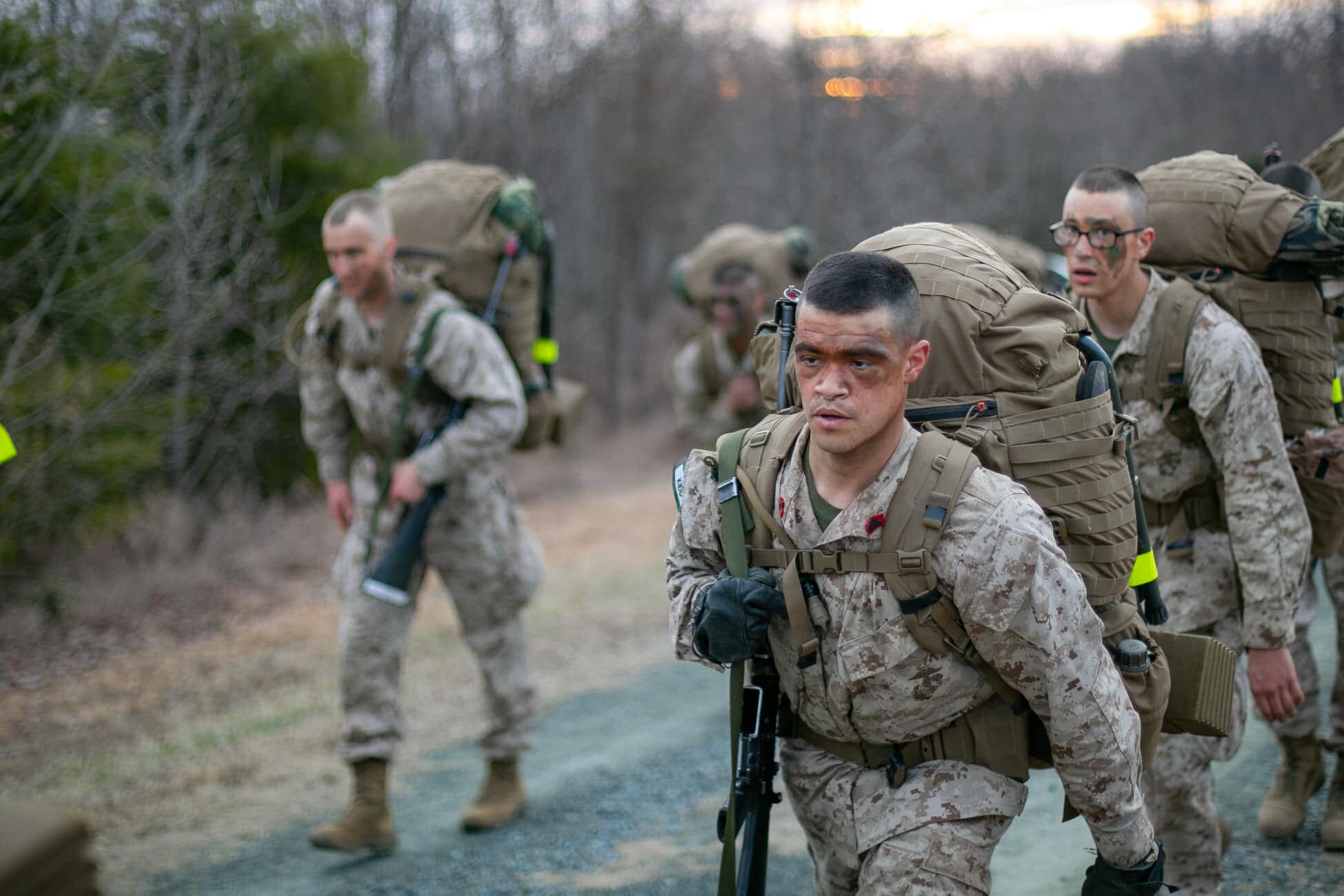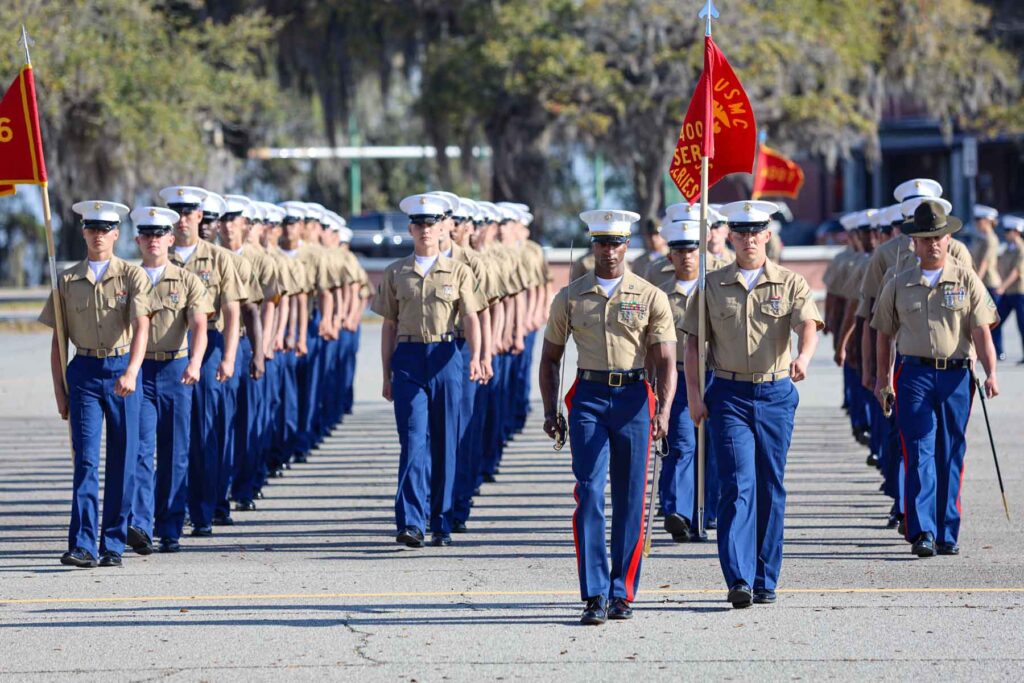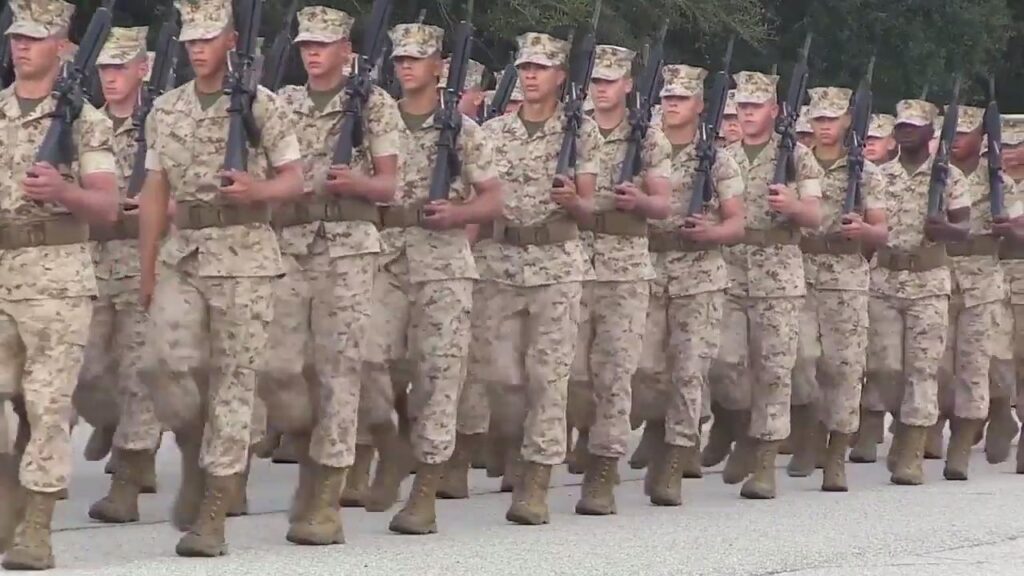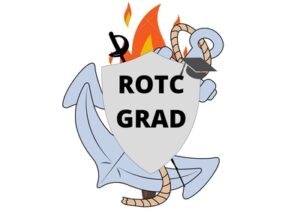
Introduction
There’s a considerable amount of differences between Marine Officer and enlisted training, specifically boot camp and Officer Candidate School. While some fundamental initial training elements remain the same like responding to drill instructor stress, it’s important to know the differences if you decide to go one route or the other.
But what are the main differences between the two? While both require extreme discipline and attention to detail, Marine Boot Camp instills instant obedience to orders, customs, courtesies, and military standards necessary to thrive in adverse environments while Officer Candidates School demands decision making in chaotic environments, higher physical fitness standards, and demonstration of the 14 leadership traits and 11 leadership principles.
Boot Camp and OCS Differences Explained
At OCS, you have to score 275 or higher on the physical fitness test.

The physical fitness test consists of pull ups, sit ups and a 3 mile run time. Recruits going to Boot Camp only need to pass via individual strength test or IST by getting 10 to 15 pull ups, 76 crunches in two minutes, and a 13 minute minimum runtime for 1.5 miles. For OCS, candidates must get 15 pull-ups minimum, 80 crunches, and faster than a 19 minute 30 second 3 mile. Performing any less than these physical standards will highlight yourself as a weaker candidate. Most candidates come in being able to do 23 pull-ups, 115 sit ups in two minutes, and run faster than an 18 minute 3 mile.
After talking to enlisted and having gone through Officer candidate school myself, the general consensus is that OCS is physically more demanding. You will work out with the Sgt instructors more often, be expected to run everywhere, and hike up to 9 miles for the culminating event with 60 pound packs.
In Boot Camp, you don’t have billets

Every recruiting Boot Camp is the same and they are expected to respond to their drill instructors the same way. Everybody’s put on an equal playing field and no one is favored above the rest. The same is true for Officer candidate school, however, candidates are put in temporary leader ship positions where they are expected to manage their own platoon of peers, keep them on track to the training schedule, and have them arrive to the right classroom at the right time. When you have a two day billet, you are expected to report to the Sgt instructors with accountability numbers and receive further instructions for the rest of the pontoon to carry out. These billets are meant to evaluate leader ship potential and put every candidate in a closer spotlight for the sgt instructors to evaluate. Some billets are more demanding than others, and it is completely random who gets assigned a position.
At OCS, you can move about freely at night
Once you hear the coveted phrase lights, lights, lights, officer candidates are allowed to get up and move about the squad bay freely to take care of miscellaneous tasks. During the night hours are when everybody writes their essays, stretches their body, and cleans up their gear for the next day. At Boot Camp, you have to sleep at the position of attention and are not allowed to move about the squad bay. The reason you can’t move about as freely in Boot Camp is not only to teach discipline, but also there has been safety violations in which recruits were a danger to themselves or others during the night hours.
In Boot Camp, you don’t take academic tests or write essays

Boot Camp has some academic demands, but nowhere near the standard as Officer candidate school because officer candidates are either college graduates or or in their senior year of school. They are also expected to study Marine Corps History, traditions, and tactical topics before they arrive. Recruits aren’t expected to know anything upon arriving. During OCS, you get assigned essays if you violate a rule such as not strapping in your canteen pouch to your belt or leaning against the wall. Recruits are not expected to write essays nor will they be assigned any additional homework outside of normal training hours.
At OCS, you get to have liberty
This is probably one of the biggest differences between the two schools. Officers are given two weekends in the two weeks before they graduate to go out in town and stay in a hotel and eat civilian food. This is meant to evaluate an officers ability to conduct himself in a gentleman manner when not under the supervision of a surgeon instructor. Surprisingly, a lot of candidates get dropped during their liberty because of misconduct. For everyone else, it is a nice break being able to call your friends and family before you graduate. Unfortunately, recruits do not have this privilege, as they will have to go all 13 weeks without talking to the outside world.
You get assigned your job specialty at Boot Camp
Officer candidates do not receive their job specialty until the basic school or “TBS.” About 2/3 of the way through, recruits will be told what job specialty they will learn after graduating Boot Camp. This is the time when a lot of recruits find out that they got a job specialty they were originally promised by their recruiter. Officer candidate all graduate together, and won’t receive their job specialty until 2/3 of the way through the basics school.
Similarities explained
OCS and Boot Camp both have a crucible culminating event
The crucible is the famous culminating event recruits go through before being given their eagle globe and anchor and officially titled, marine. It’s a 36 hour nonstop physical event the demands of teamwork, mental grit and fortitude. You can Google tons of videos on what the crucible looks like. For Officer candidates, their culminating event is a 9 mile 60 pound hike followed by 12 to 14 hours of continuous squad maneuvers. By the end of that event, we totaled around 40 miles on our feet with up to 15,000 calories burned.
OCS and Boot Camp both instill rifle drill

You can YouTube tons of videos on what marine core drill looks like. It’s not the fancy ones that you see the honor platoon do with the bayonets and rifle tosses. It’s basic handling of the rifle with quick snap movements all in unison with the rest of your platoon. It’s a weird concept to get the hang of, but you do it so much at both trainings that you’re actually pretty decent by the end of it. If you do Navy ROTC before going to OCS, you’ll be extremely well practiced by the time you show up. Drill is meant to teach discipline and extreme attention to detail as well as unified movement with your teammates.
They both stand on the yellow foot prints and get yelled and screamed at
Both trainings are equally intense with the yelling and screaming. Drill instructors can teach at both schools and induce the same amount of chaos. I can’t personally speak to enlisted Boot Camp, but for OCS, the yelling and screaming slowly dies down as the platoons become more disciplined are and better at executing instructor commands.
Sergeant and drill instructors stay with their platoons the entire time
Each platoon usually has three or for instructors that trained them the entire period of instruction. Do you actually get to know them really well and there is intermittent time during both schools to learn about their real world military experience. Heart of them molding officers and recruits entails classes on ethics, what it means to be a good Marine and citizen. If they do their job right, every officer and recruit will tell you their drill instructor made them a better person.
How to prepare for Boot Camp versus OCS
Conduct bodyweight and cardio circuit workouts early in the morning.
There isn’t a whole lot you can do to prepare for moving quickly and accomplishing tasks with extreme precision and attention to detail. However, most of the physical activity you do a Boot Camp will involve bodyweight exercises during random hours in the day. If you aren’t used to waking up as early as 5 AM, I would recommend trying to change your sleep schedule a little bit so it’s not as much of a shock by the time you arrive.
There aren’t a lot of unit workouts at Boot Camp like OCS, but you’ll be making your life a lot easier if you can show up with great physical fitness A good benchmark to train for that will put you significantly above your peers is being able to score a 275 or higher on the Marine Corps physical fitness test. This would entail being able to do 20 to 23 pull ups, 110 to 115 crunches in two minutes, and running 3 miles at an 18 minute total pace
Watch videos on rifle drill
Drill is an extremely confusing art to get good at if you’ve never seen or done it before. It requires good coordination with your arms and legs and if you aren’t good at it, you will easily highlight yourself in the platoon and the drill instructors will lock onto you. Unless you have an M-16 with all the rail guards on it, there isn’t a way to really practice. But watching some in-depth videos on drill will really help you blend in during those evolutions.
Learn a little bit of USMC history and customs and courtesies
You will be exposed to the extremely impressive history of the Marine Corps. Already having a good base of understanding well not only motivate you, but also impress your class and the drill instructors if they challenge you with knowledge questions. You can actually go on Quizlet and find a bunch of these topics that you should now going into Boot Camp.
How to train for OCS versus Boot Camp
Run a lot and get really good at pull-ups, sit ups, and hiking
As mentioned earlier in this article, you have to score really well on the physical fitness test and the combat fitness test to be a good candidate at OCS. There are also three graded hiking events ranging from 3 miles 6 miles and 9 miles with 60 pound packs. Every morning, you will conduct a circuit workout with the dedicated fitness instructor at OCS while your sergeant instructors pay close attention to you.
You need to be really good at bodyweight exercises as well as lifting weights such as kettle bells and tires. It’s also important to be able to claim ropes and vault over obstacles. Running is 80% of the exercise you will get during OCS. You need to be good at running 5 to 6 miles almost without stopping and without sustaining shin splints.
Review as many Quizlet knowledge decks as you can
They will rapidfire teach a bunch of Marine Corps concepts during the classroom portions of your training day. You will then be expected to take a multiple choice, 50 question test on those topics with an hour of study a day. If you can learn a lot of his knowledge before hand, it will make your life a lot less stressful when you show up in Quantico.
Read books on leadership and famous military historical figures
Throughout OCS you will be expected to write intelligently about leadership and what it means to you. Studying famous leaders like Mattis, Lincoln and even people like basketball coach John Wooden will make you stand out if you’re able to cite examples and utilize various leadership philosophies. It also helps you understand what good and bad leadership looks like and gives you principles you can apply.
Conclusion
Now that you understand the differences between the two training pipelines you can make a more informed decision and hopefully prepare accordingly.
If you have any other questions or comments, or if anything was unclear, feel free to reach out at theyouculture@gmail.com and I’ll do my best to respond. Thanks for reading and be sure to check back regularly for new articles.
